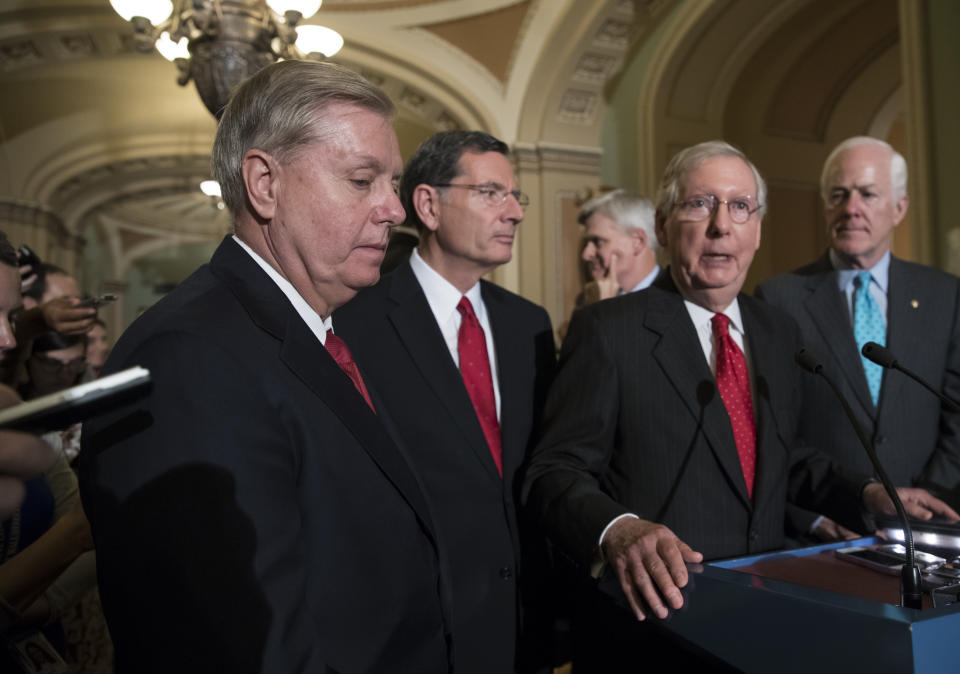Republicans look to next year for Obamacare repeal: 'The bill's dead, OK?'
WASHINGTON — Senate Republicans are now pushing back their goal of repealing and replacing Obamacare until fiscal year 2019, killing a last-ditch attempt to deliver on their long-held campaign promise before the end of the month.
Sens. Lindsey Graham, R-S.C., and Bill Cassidy, R-La., announced during the weekly Republican lunch meeting that they didn’t have 50 votes to pass their plan, but that they would send the bill through the regular committee process to try to build up more support for it.
“What am I confident of? With a new process, with more hearings, with regular order, that we’re going to get 50 votes,” Graham told reporters Tuesday.
Some GOP lawmakers took an upbeat tack, with Sen. Richard Shelby, R-Ala., telling reporters he hopes repeal could happen before the end of the year. Sen. Ted Cruz, R-Texas, called the Sept. 30 deadline “not significant,” suggesting Congress could still vote to repeal Obamacare at any moment.
But an Obamacare repeal vote is likely now at least a year away, since the Senate can use a special procedure called reconciliation — which allows legislation to move forward with just 50 votes — only one time per fiscal year. Several Republican senators exiting the meeting said that tax reform would likely be the only reconciliation bill of the next fiscal year, which begins Oct. 1.
“Look the bill’s dead, OK?” Sen. John Kennedy, R-La., said of Graham-Cassidy. “It’s deader than a doornail. We’re not even going to have a vote on the thing.”
Rick Santorum, a former GOP senator who helped craft Graham-Cassidy, said after the meeting that both Graham and Cassidy stood up during the lunch and asked for their bill to go through regular order, meaning a bipartisan committee markup process instead of forcing their colleagues to take a vote on it now. The senators want to try to push the bill through in the 2019 fiscal year, which begins in October 2018.
There’s still the possibility that Senate Republicans could try to attach health care to tax reform and push them through on the same reconciliation vehicle. But Sen. Mike Rounds, R-S.D., said several senators felt that would be unwise, since both are complicated issues, but “you never know what might happen.”

Kennedy said he hoped Republicans had learned lessons through the multiple failures of Obamacare repeal that they would apply to their tax-reform process. He criticized multiple health care plans coming out one after the other, with GOP senators forced to defend bills when they weren’t even sure of their ever-shifting contents.
“I don’t think Sen. McConnell was in charge of the last process,” Kennedy said of Graham-Cassidy. “It sort of took on a life of its own. But we’re in a new process now with tax reform, and I want to get it done.”
The repeal-and-replace effort revived earlier in September when Graham and Cassidy pressed their colleagues to pass their proposal before the Sept. 30 reconciliation vehicle expired. Sen. John McCain, R-Ariz., a close friend of Graham’s, came out against the bill on Friday, saying he could not support it, since it didn’t go through the regular committee process. Sen. Susan Collins, R-Maine, and Sen. Rand Paul, R-Ky., also came out against it.
Senate Republicans are fearful of blowback from the base over the failed legislative push.
“I don’t think it’ll affect anything yet,” Shelby said. “It could down the road.”
Republican senators predicted that they would eventually succeed on health care.
“Well, they’re going to be frustrated, and I don’t blame them,” Sen. John Thune, R-S.D., said of GOP voters. “I hope they have a little bit of patience and realize that Congress is a two-year exercise, and it’s not over yet. Give us a chance to get us a result.”
Read more from Yahoo News:
Clinton agrees with interviewer that authenticity is a ‘bulls*** concept’
Roger Stone: Manafort’s mood ‘amazingly good’ despite coming indictment
Locals take on China’s invasion of Africa’s biggest economy: ‘They’re like Goliath, we’re David’
Photos: Health care bill protesters descend on Senate hearing



